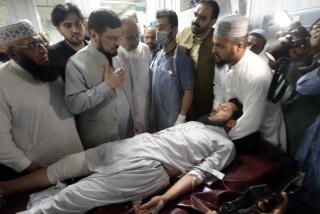Female Suicide Bomber Kills 7
- Share via
BAGHDAD — A female suicide bomber disguised in traditional male robes killed seven people and wounded at least 35 others outside a police recruitment center in the troubled northwestern city of Tall Afar on Wednesday, Iraqi officials said.
The bomber was believed to be the first woman to carry out a suicide attack in Iraq since U.S.-led troops ousted President Saddam Hussein in April 2003, and locals met the news with a weary sense of inevitability brought on by the continuing violence.
“I am not surprised to hear this news,” said Abed Hazzem, a police officer in Baghdad. “We are on the lookout for anything. They’ve used dogs, donkeys, poisoned food and now women.”
The unusual attack came amid a spate of violence across Iraq in which at least 22 other people were reported killed.
In Baqubah, north of Baghdad, a suicide bomber aimed his vehicle at Iraqi police near the main entrance to the city. The bomb exploded close to the checkpoint, killing a passing driver, who was hit in the head by flying shrapnel, a witness said. More than a dozen people were injured.
Near the southern city of Safwan, two American convoys were hit by roadside bombs within an hour Wednesday, killing two soldiers and an airman, U.S. military officials said. American officials also announced an investigation into the death of a Marine near Fallouja two days earlier from a noncombat gunshot wound. A third soldier, assigned to the 2nd Marine Division, 2nd Marine Expeditionary Force, died Tuesday after he was shot in battle in Ramadi, officials said.
U.S. forces clashed with gunmen near Ghazaliya on Baghdad’s western edge and a passing driver was killed by stray bullets, Iraqi officials said.
Police discovered the bodies of seven men near a railway line in Shula, a northwestern Baghdad district. The men, who had been blindfolded, handcuffed and shot execution-style, were Sunnis from the neighborhood of Hurriya who had been captured by unknown men Tuesday night, said Adnan Dulaimi from the Sunni People’s Conference.
In the holy city of Najaf, south of Baghdad, two people were killed when a bomb exploded outside the home of a bodyguard to radical Shiite cleric Muqtada Sadr, Associated Press reported.
Insurgents have stepped up their bloody campaign after a U.S.-Iraqi military offensive in Tall Afar, near the Syrian border, this month. The violence has mostly targeted Shiites. But in recent months, there have also been reports of police abuses against Sunnis.
Tall Afar residents have slowly begun returning to a town patrolled by soldiers and fortified with checkpoints, sandbags and barbed wire. Iraqi officials said 160 suspected rebels have been killed and more than 700 people detained in the offensive.
The suicide bombing in Tall Afar came after meetings Tuesday between Iraqi government envoys and local leaders aimed at encouraging residents to sign up with the Iraqi police.
The cloaked woman struck the recruitment center as it opened for the first time Wednesday. Mingling with recruits and people seeking government aid, she detonated her explosives as she reached the center of the crowd, Maj. Jamil Mohammed Saleh said.
In an Internet posting, Al Qaeda in Iraq, the group led by Jordanian-born militant Abu Musab Zarqawi, claimed responsibility, praising the attacker as “a blessed sister,” Associated Press reported.
Before the explosion, “I heard some people saying ‘make way for her,’ ” said a 22-year-old recruit, who said the bomber was well dressed, with a green cloak.
“Women being involved in such operations would really make us concerned and worried,” said Haider Ebadi, a spokesman for transitional Iraqi Prime Minister Ibrahim Jafari.
Although female suicide bombers have struck repeatedly in Israel, Chechnya and elsewhere in Russia, there have been few such attacks in Iraq. Two women killed three American soldiers when they blew up their car at a checkpoint near the city of Haditha days before Baghdad fell in April 2003. Six months later, a woman was caught carrying explosives as she was about to enter a government building in Baghdad.
The Tall Afar attack could lead to stricter security measures for women, Ebadi said, adding that those in turn could lead to trouble between civilians and soldiers.
According to Islamic beliefs, men should not even touch women who are not their wives or close relatives. At the heavily fortified Green Zone in Baghdad, for example, women enter separate lines and are searched by other women. But at some Iraqi checkpoints in the city, women are largely left alone.
Meanwhile, in Washington, in remarks to reporters Wednesday, President Bush painted an upbeat picture of developments. “The terrorists will fail,” he said. “See, the Iraqis want to be free.”
Bush said U.S.-led forces had dealt a strong blow to insurgents in recent days with the killing of Abu Azzam, whom they identified as the No. 2 leader of Al Qaeda in Iraq. Azzam was shot during a raid in Baghdad over the weekend.
“This guy was a brutal killer,” Bush said, declaring that the “plan to win” includes “hunting down high-valued targets like Azzam.”
Still, Bush warned of the likelihood of escalating violence in the run-up to the Oct. 15 Iraqi referendum on the constitution, comments echoed in London by British Foreign Secretary Jack Straw, who warned of “more dark moments” in Iraq.
Times staff writers Suhail Affan, Saif Rasheed and Caesar Ahmed in Baghdad and a special correspondent in Mosul contributed to this report.
More to Read
Sign up for Essential California
The most important California stories and recommendations in your inbox every morning.
You may occasionally receive promotional content from the Los Angeles Times.












